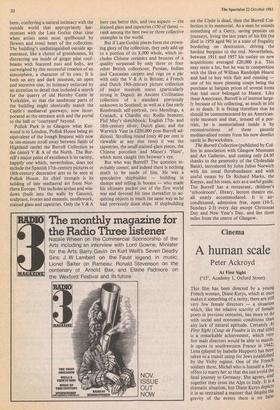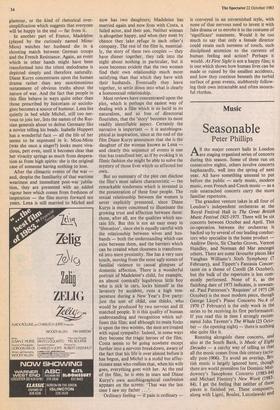Cinema
A human scale
Peter Ackroyd
At First Sight
('15', Academy I, Oxford Street) This film has been directed by a young French woman, Diane Kurys, which at once makes it something of a rarity; there are still very few female directors — a situation which, like the relative scarcity of female poets in previous centuries, has more to do with social and economic conditions than any lack of natural aptitude. Certainly At First Sight (Coup de Foudre is its real title) is a remarkable achievement, which verY few male directors would be able to match. It opens in southwestern France in 1942; Lena (played by Isabelle Huppert) has been taken to a transit camp for Jews established by the Vichy regime. One of the French soldiers there, Michel who is himself a Jew, offers to marry her so that she can avoid the fatal journey to Germany. She agrees, and together they cross the Alps to Italy. It IS a dramatic situation, but Diane Kurys depicts it in so restrained a manner that despite the gravity of the events there is no false
glamour, or the kind of rhetorical over- simplification which suggests that everyone will be happy in the end — far from it.
In another part of France, Madeleine (played by the curiously named Miou- Miou) watches her husband die in a shooting match between German troops and the French Resistance. Again, an event which in other hands might have been transformed into the tritest melodrama is depicted simply and therefore naturally. Diane Kurys concentrates upon the human drama rather than any sanctimonious restatement of obvious truths about the nature of war. And the fact that people in this film behave in ways quite other than those prescribed by historians or sociolo- gists becomes a source of humour. Lena lies quietly in bed while Michel, still too ner- vous to join her, lists the names of the Rus- sian generals about to defeat Germany like a novice telling his beads. Isabelle Huppert has a wonderful face — all the life of her seems to be expressed in it. Miou-Miou (was she once a singer?) looks more viva- cious, pert even, until it becomes clear that her vivacity springs as much from despera- tion as from high spirits: she is the original case of someone having nothing to lose.
After the climactic events of the war — and, despite the familiarity of that wartime weariness and immediate post-war jubila- tion, they are presented with an added vigour here which comes from freshness of inspiration — the film moves forward ten years. Lena is still married to Michel and now has two daughters; Madeleine has married again and now lives with Costa, a failed actor, and their son. Neither woman is altogether happy, and when they meet by chance they take refuge in each other's company. The rest of the film is, essential- ly, the story of these two couples — they have dinner together, they talk into the night about nothing in particular, but it soon becomes evident that the two women find their own relationship much more satisfying than that which they have with their husbands. Eventually they leave together, to settle down into what is clearly a homosexual relationship.
Most reviews have concentrated upon the plot, which is perhaps the easiest way of dealing with a film which is so lucid in its naturalism, and so free of directorial flourishes, that the 'story' becomes its most readily identifiable aspect. Certainly the narrative is important — it is autobiogra- phical in inspiration, since at the end of the film Diane Kurys announces that she is the daughter of the woman known as Lena — and clearly this sequence of events is one that has transfixed her, as if by evoking it in filmic fashion she might be able to solve the mystery of those lives which so affected her own.
But no summary of the plot can disclose the film's most salient characteristic — the remarkable tenderness which is invested in the presentation of these four people. The sexual relationship between the women is never explicitly presented, since Diane Kurys is more concerned to illuminate the growing trust and affection between them: those, after all, are the qualities which sus- tain life. But this is not an easy essay in 'liberation', since she is equally careful with the relationship between wives and hus- bands — both the understanding which can exist between them, and the barriers which can be created when closeness is transform- ed into mere proximity. She has a very sure touch, moving from the most ugly scenes of familial violence to casual glimpses of domestic affection. There is a wonderful portrait of Madeleine's child, for example, an almost comically lugubrious little boy who is sick in cars, locks himself in the lavatory by accident, runs a high tem- perature during a New Year's Eve party: just the sort of child, one thinks, who would be produced by two nervous and ill matched people. It is this quality of human understanding and recognition which suf- fuses this film; and although its main focus is upon the two women, the men are treated with equal sympathy. Indeed, in some ways they become the tragic heroes of the film. Costa seems to be going nowhere except further into a nervous breakdown, aware of the fact that his life is over almost before it has begun, and Michel is a stolid but affec- tionate man who realises that, when his wife goes, everything goes with her. At the end of the film, he is seen in tears and Diane Kurys's own autobiographical confession appears on the screen: 'That was the last time I saw my father ...
Ordinary feeling — if pain is ordinary —
is conveyed in an unvarnished style, with none of that nervous need to invest it with fake drama or to enrobe it in the costume of 'significant' statement. Would it be too much to say that only a female director could retain such sureness of touch, such disciplined attention to the currents of human feeling and action? Perhaps it would. At First Sight is not a happy film; it is one which shows how human lives can be made or ruined by the smallest accidents, and how they continue beneath the turbid surface of great events, stubbornly follow- ing their own intractable and often mourn- ful rhythm.















































 Previous page
Previous page